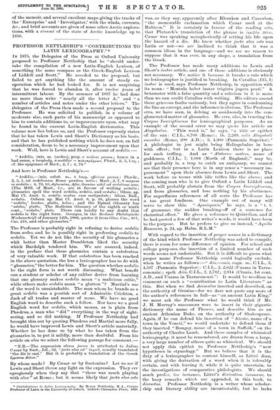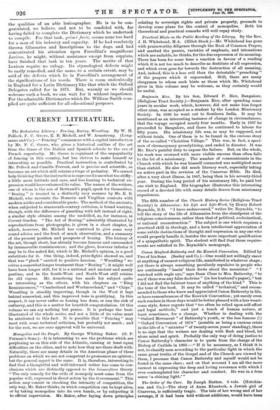PROFESSOR NETTLESHIP'S " CONTRIBUTIONS TO LATIN LE XIC 0 GRAPHY."
* IN 1875, the Delegates of the Press at Oxford University proposed to Professor Nettleship that he " should under- take the compilation of a new Latin-English Lexicon, of something the same compass as the Greek-English Lexicon of Liddell and Scott." He acceded to the proposal, but failed to get anything like the amount of steady co- operation which he had looked for. It is not surprising that he was forced to abandon it, after twelve years of intermittent labour. By the summer of 1887 he had done no more than write " nearly all the letter A," and " a number of articles and notes under the other letters." The Delegates of the Press then made a second proposal to the Professor. He was solicited to publish, in a volume of moderate size, such parts of his manuscript as appeared to him to contain additions to, or improvements upon, what may
be found in the current Latin-English dictionaries. This volume now lies before us, and the Professor expressly states that he has taken Lewis and Short's Dictionary as his basis, and that he has published nothing which he does not, on full consideration, deem to be a necessary improvement upon that work. Well, here is Lewis and Short's account of ardelio :- " Arderio, onis, m. (ardeo), prop. a zealous person; hence in a bad sense, a busybody, a meddler = roxeorp&Tp.wp, Phaed., 2, 5,1 sq. ; cf. the epigrams of Mart., 2, 7 ; 4, 79."
And here is Professor Nettleship's:— " subst. m., a busy, officious person : Phwdr., 2, 5, 1, est ardelionum Rowe gucedam natio ; Mart., 2, 7, 8 magnus es ardalio ; 4, 79, 10, deformius, Afer, Omnino nihil est ardalione sene. (The MSS. of Mart., Lc., are in favour of writing ardalio ; glossaries spell the word ardalio, ardelio, and ardulio : Gloss. ap. Mai Cl. Auct. 6, ardelio acutus cunt malignitate ; Gloss. Ball., ardulio. Osbern ap. Mai Cl. Auct. 8, p. 56, glosses the word ardelio,' lecator, glutto, heluo ; and the Epinal Glossary has adoleo,' ghetto. The Bodleian Glossary of the eighth or ninth cent., ardalio,' gluto. There can hardly be any doubt that ardalio is the right form. Georges, in the Berliner Philologische Wochenschrift of January 12th, 1889, quotes it from Glos. Cas., 401, Cas. 218, and other glossaries."
The Professor is probably right in refusing to derive ardelio from ardeo, and he is possibly right in preferring ardalio to ardelio. Yet we do not like the security of his glossaries a whit better than Master Dumbleton liked the security which Bardolph tendered him. We are assured, indeed, in the preface that these glossaries contain a substratum of very valuable work. If that substratum has been reached in the above quotation, the less a lexicographer has to do with " glossaries," the better for him. The question whether ardalio be the right form is not worth discussing. What benefit can a student or scholar of any calibre derive from learning that one glossary makes ardelio mean " a: malicious critic," while others make ardelio mean "a glutton "? Martial's use of the word is unmistakable. The man whom he brands as a great ardelio was a poorish sort of Admirable Crichton, a Jack of all trades and master of none. We have no good English word to describe such a fellow. Nor have we a good English word for ardelio, which means, as is plain from Phmdrus, a man who " did" everything in the way of sight- seeing, and so did nothing. If Professor Nettleship had brought this out by quoting Phmdrus and Martial more fully, he would have improved Lewis and Short's article materially. Whether he has done so by what he has taken from the glossaries is, to put it mildly, more than doubtful. From his article on alea we select the following passage for comment :—
"N.B.—The expression aleam jacere is attributed to Julius Caesar by Suet., Jul., 32, jacta alai est' inguit, usually translated 'the die is cast.' But it is probably a translation of the Greek gpporrai fiAor."
By whom made ? By Caesar or by Suetonius? Let us see if Lewis and Short throw any light on the expression. They err egregiously when they say that " there was much playing with aim" at Rome ; but it seems likely that jacks alea esto
Contributions to Latin Lexicography. By Henry Nettleship, M.A , Corpus Professor of Latin in the University of Oxford. Oxford: Clarendon Press. 1889. was, as they say, apparently after Rhunken and Casaubon, " the memorable exclamation which Caesar used at the Rubicon." It is certainly in favour of the reading esto, that Plutarch's translation of the phrase is 4/3100 Aiwoc. Omar was speaking metaphorically of setting his life upon the hazard of a die. He knew whether jacta alea esto was Latin or not—we are inclined to think that it was a common idiom in the language—and we see no reason to suppose that it was ever, in any shape, a translation from the Greek.
The Professor has made many additions to Lewis and Short's instar article, and one of those additions is obviously not necessary. We notice it because it breaks a rule which no lexicographer is justified in breaking. In Catullus (115, 1) instar is used, says Professor Nettleship, in apposition with its noun : " Mentula, habet instar triginta jugera prati." A hexameter with a false quantity and a solecism in it is more than we can credit Catullus with writing. His editors amend these grievous faults variously, but they agree in condemning the line as corrupt, and the inference is obvious. The Professor errs, we have seen, in delving so assiduously into the con- glomerated matter of glossaries. He errs, also, in trusting the Corpus Inscriptiorurn for lexicographical purposes. As an example of the second error we may quote his article on Alagabalus. "This word is," he says, " a title or epithet of the sun : C.I.L., 6,708 (Rome) ; ib. 2,269, solis Alagabali sacerdos (Rome, 200 A.D.) ; 3, 4,300 (Pannonia Superior).'' A philologist in jest might bring Heliogabalus in here with effect; but in a Latin Lexicon there is no place for such trifling. And as " Alaterwe matres, name of goddesses, C.I.L., 7, 1,084 (North of England)," may be, and probably is, a trap to catch an antiquary, we cannot see that their presence here is in any sense a " necessary im- provement " upon their absence from Lewis and Short. The work before us teems with idle trifles like the above ; and the coming man who is to give Oxford a Latin Liddell and Scott, will probably abstain from the Corpus Inscriptiorum, and from glossaries, and lose nothing by his abstinence. For superfluous references of all sorts the Professor has a too great fondness. One example out of many will serve to show this. " Aposiopesis," be says, is a " t. t. of grammar, the sudden breaking-off of a sentence for rhetorical effect." He gives a reference to Quintilian, and if he had quoted a few of that writer's words, it would have been to the purpose. But he prefers to give us instead, "Aquila Roman us, p. 24, ap. Halm. R.L.M."
With regard to the insertion of proper names in a dictionary of the kind which Professor Nettleship was asked to compile, there is room for some difference of opinion. For school and college purposes, the insertion of a limited number of such words seems not undesirable. But it is difficult to guess what proper name Professor Nettleship could logically exclude, when he writes as follows :—" Aio,—onis, cogn. m., C.I.L., 3, 4,597 (Pannonia Superior) : C.I.L., 2, 2,622 (Uxama in Tarra- conensis) ; spelt Aiio, C.I.L., 2, 2,782; 2,814 (Clunia, 1st cent. A.D., and Uxama in Tarraconensi.") It would be needless to comment on such a "contribution to Latin Literature" as this. But when we find Aremulus inserted and described, on the authority of Orosius—for we dare not quote any more of the author's references in full—as " an ancient Latin King," we must ask the Professor what he would think if Mr. J. H. Murray's successors were to insert in their gigantic dictionary the name of Theseus, and describe him as an ancient Athenian Duke, on the authority of Shakespeare. Again, if he can defend his insertion of " Ateste, name of a town in the Veneti," we would undertake to defend them if they inserted " Bungay, name of a town in Suffolk," on the authority of Charles Lamb. And these samples of whimsical lexicography, it must be remembered, are drawn from a large, a very large number of others quite as whimsical. We should not apply this epithet to Professor Nettleship's " new hypotheses in etymology." But we believe that it is the duty of a lexicographer to content himself, as Lithe does, with giving the derivation of a word when it is tolerably certain, and with leaving it, while it is quite uncertain, to the investigations of comparative philologists. We should much prefer, for instance, Littre's derivation in,connue, to the hazy remarks which are appended, in this book, to dierectus. Professor Nettleship is a writer whose scholar- ship and literary ability are incontestable, but he lacks the qualities of an able lexicographer. He is to be con- gratulated, we believe, and not to be condoled with, for having failed to complete the Dictionary which he undertook to compile. For that task, prima, facie, seems none too hard for a man of his industry and capacity. If he had resolutely thrown Glossaries and Inscriptions to the dogs, and had concentrated his attention upon Forcellini's magnificent Lexicon, he might, without assistance except from copyists, have finished that task in ten years. The merits of that Lexicon require no eulogy. Its etymological defects might be easily remedied, and the same, to a certain extent, may be said of the defects which lie in Forcellini's arrangement of the significations of his words. There is room undoubtedly in England for a Latin Dictionary like that which the Oxford Delegates called for in 1875. But, warmly as we should welcome such a book, we can wait for it without impatience. For the admirable Dictionaries which Dr. William Smith com- piled are quite sufficient for all educational purposes.



















































 Previous page
Previous page